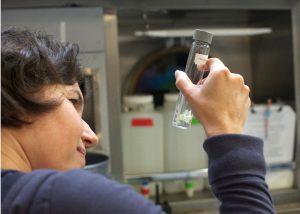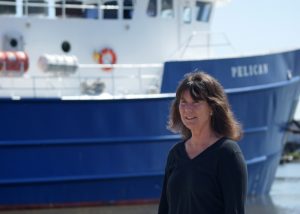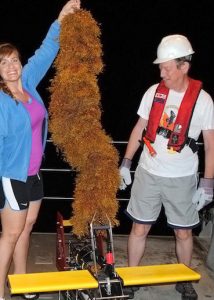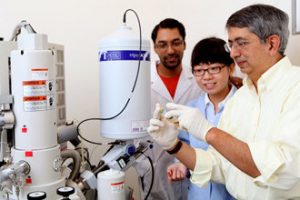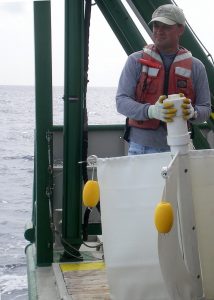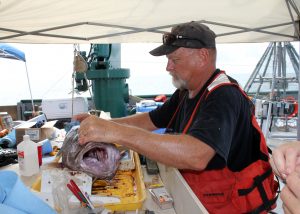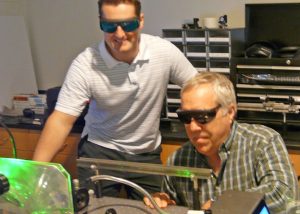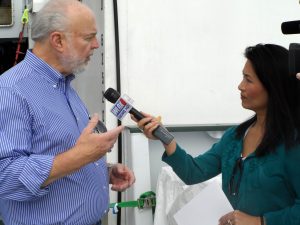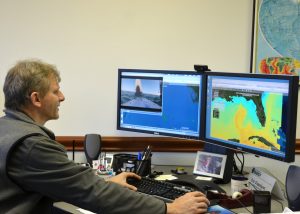The Human Side of Oil Spill Science
– April 8, 2013
Events from the Deepwater Horizon oil spill three years ago remain on the minds and hearts of many people, especially for those who lost loves ones. When an incident of this magnitude strikes, the story is sometimes as much about the response as the event itself; and part of the response is from the science community.
In 2011, the Gulf of Mexico Research Initiative awarded $112.5 million to eight research consortia for studies to help us understand the oil spill, its impacts, and ways to respond better in the future. Experts from many fields of science have come together in an unprecedented manner to provide sound and trusted information. Eight Gulf-based scientists lead these teams from over 80 research institutions in 29 U.S. states and 4 countries. These directors share their perspectives about this research and their desire to help.
Our home, too
These directors live and work in the Gulf states and care about this region:
Cocodrie [Louisiana] went from a fishing, crabbing, and oystering village overnight to an oil spill operations center. It changed the character of the area, what people could do, and how they made their living. – Dr. Nancy Rabalais, Louisiana Universities Marine Consortium, Director of the Coastal Waters Consortium (CWC)
The spill was a tragedy for the whole Gulf area, particularly in Louisiana coming on the heels of Hurricanes Katrina, Rita, and Ike. It had a huge effect economically, psychologically, and sociologically. – Dr. Piers Chapman, Texas A&M University, Director of the Gulf of Mexico Integrated Spill Response (GISR) Consortium
It was traumatic for our city, but I saw how I could work with world-class chemists, chemical engineers, and physicists and together we could contribute to what was actually happening right now in the Gulf. – Dr. Vijay John, Tulane University, Director of the Consortium for the Molecular Engineering of Dispersant Systems (C-MEDS)
The Gulf is very important to our community. I felt we had to respond. I put my heart and soul in this research. – Dr. Tamay Özgökmen, University of Miami, Director of the Consortium for Advanced Research on Transport of Hydrocarbon in the Environment (CARTHE)
An event like no other
The enormity of this spill called for extraordinary research to find answers:
This is perhaps the largest science mobilization around an ocean-related event in history. Questions about dispersants, oil, and toxins are not easy to answer and require groups of researchers with different expertise. – Dr. Steven Murawski, University of South Florida, Director of the Center for Integrated Modeling and Analysis of Gulf Ecosystems (C-IMAGE) consortium
Our world’s problems are getting more complex and the spill has the complexities of environmental and societal impacts. We must make the best use of resources and work together, integrating studies to truly advance science. – Dr. Edward Buskey, University of Texas at Austin Marine Science Institute, Director of the Dispersion Research on Oil: Physics and Plankton Studies (DROPPS) consortium
Having worked on the Exxon Valdez oil spill, I knew this research would be extremely intense, demanding, and large scale. It changed our lives. – Dr. Raymond Highsmith, University of Mississippi, Director of the Ecosystem Impacts of Oil and Gas Inputs to the Gulf (ECOGIG) consortium
All these institutions together are using a broad framework to address the overall concept of the oil spill and the coastal ecosystems – it’s a new level. – Dr. Nancy Rabalais, CWC
I asked many older scientists, ‘What’s the most significant ocean event that happened in your lifetime?’ and they said, ‘This one.’ This is the biggest project of my career. – Dr. Tamay Özgökmen, CARTHE
Science to inform and empower
These directors understand that people are eager for information:
Most people think that another spill like this will happen again despite all the best efforts of industry. The science coming out of this disaster is a good thing if it helps prevent a similar spill or allows us to mitigate the effects of it. – Dr. Piers Chapman, GISR
When the spill happened I received a lot of calls asking, ‘Where is the oil going?’, ‘Will our beaches be ruined? and ‘What will happen to the Gulf in the long-term?’ Our interdisciplinary team of scientists is working hard to address these questions. – Dr. Eric Chassignet, Florida State University, Director of the Deepsea to Coast Connectivity in the Eastern Gulf of Mexico (Deep-C) consortium
People want to know how and why dispersants were applied and what it means when they are used. Once people understand that, then they can evaluate on their own the tradeoffs between what has or hasn’t been done and talk with knowledge to their representatives about their needs and impacts. – Dr. Vijay John, C-MEDS
People are concerned about marine life and we are studying how dispersed oil impacts the base of the marine food web and the pros and cons of dispersants used below the surface or in open waters. We want to have a better understanding of the impacts before the next spill occurs. – Dr. Edward Buskey, DROPPS
Now when I go to a hairdresser, it is much easier for me to talk about the science I do because everybody cares about oil spills and appreciates how these events can impact our lives. – Dr. Tamay Özgökmen, CARTHE
When you really see the consequences on people, it takes away the abstract of science and reframes the issues. We have big societal issues here that people care about – how to deal with energy development and what are the costs to humans and their quality of life. – Dr. Steven Murawski, C-IMAGE
Just the Facts
These researchers conduct independent science for better decisions:
We are scientists seeking to understand what happened and what is going to happen. We want to be honest brokers of information. We have a high-quality, dedicated team who is looking for the truth. – Dr. Raymond Highsmith, ECOGIG
The science community is viewed with much different credibility than are people who are managing this spill from industry and government. We have a unique role to play as the independent arbiter of what happened and what we should be doing, irrespective of the costs, to actually help society. – Dr. Steven Murawski, C-IMAGE
Working together for the good of the Gulf
This research effort will provide benefits to the region for years to come:
The partnerships and shared vision will be an enduring legacy of the program. We will see more multidisciplinary work in the future building on the extensive network of collaborating researchers through these partnerships. We’ll have science that can help us fight the next oil spill better. – Dr. Steven Murawski, C-IMAGE
This research effort brings scientists together who otherwise might not have had a reason to collaborate. Ours is an extraordinary group. A large number of them are students so this is a unique opportunity for them to grow in their profession, working alongside experts in their fields of study. They are the next generation of scientists. – Dr. Eric Chassignet, Deep-C
This collective effort has been terrific to meet good scientists and work on a major problem addressed by other disciplines. You form these relationships for one project, but they have applications in what happens much later, too, like for coastal restoration. All these connections we’ve been forming, that’s how this all comes together for a continued legacy. – Dr. Vijay John, C-MEDS
The ecosystem includes humans. The health of ecosystems goes hand in hand with the health of the social structure and the economy, so we’re all on a path together. There are obvious and subtle impacts and we are committed to follow-through on the things we are finding out. – Dr. Nancy Rabalais, CWC
From this science, we can learn more about the ocean and have an impact on society. People care about the coast. This work is benefiting society. Fisheries will benefit. Students are getting educated. It’s meaningful research. – Dr. Tamay Özgökmen, CARTHE
The Gulf of Mexico Research Initiative (GoMRI) is a 10-year, $500 million independent research program established by an agreement between BP and the Gulf of Mexico Alliance to study the effects of the Deepwater Horizon incident and the potential associated impact of this and similar incidents on the environment and public health.
© Copyright 2010- 2017 Gulf of Mexico Research Initiative (GoMRI) – All Rights Reserved. Redistribution is encouraged with acknowledgement to the Gulf of Mexico Research Initiative (GoMRI). Please credit images and/or videos as done in each article. Questions? Contact web-content editor Nilde “Maggie” Dannreuther, Northern Gulf Institute, Mississippi State University (maggied@ngi.msstate.edu).

